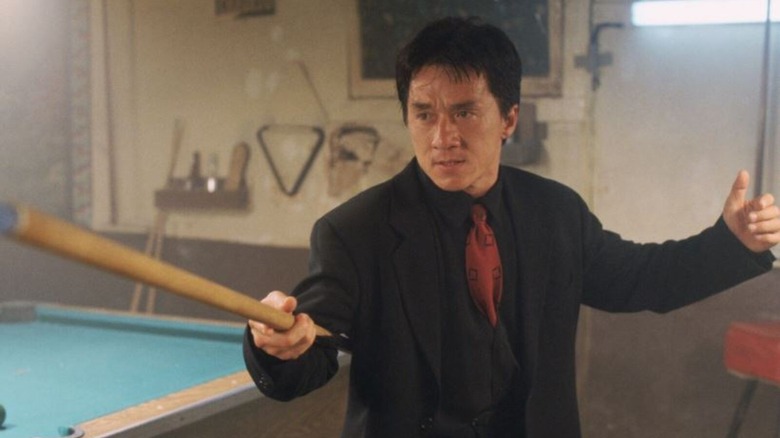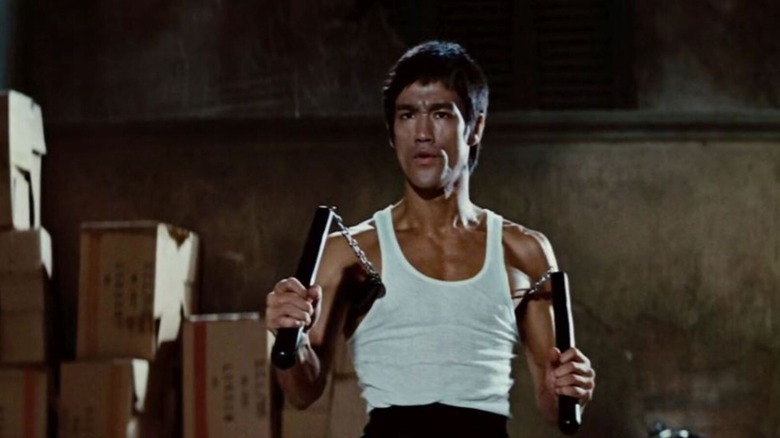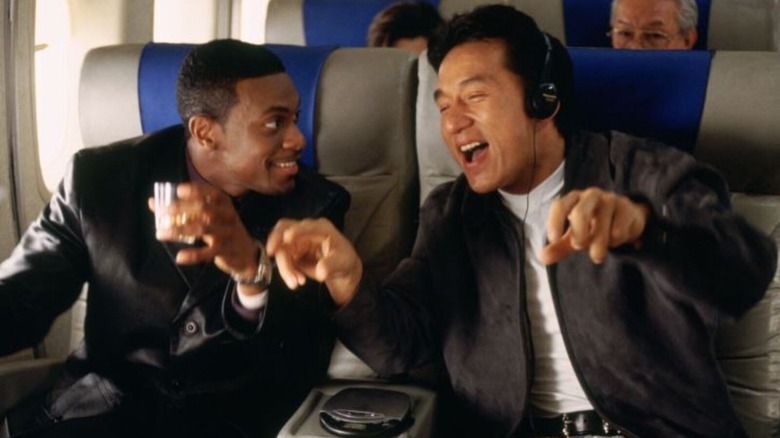Mixing Comedy And Kung Fu Was A Strategic Move For Jackie Chan
Many martial arts movies show how kung fu is used for more than just self-defense. Often the movies center young hotshot protagonists eager to learn some secret style or special maneuver so they can go out and kick butt, only to be cut down to size by their older, Yoda-esque mentors who uses the teachings of the martial arts to strengthen the pupil's mind, body, and spirit. The protagonists walk away from the film with deeper understandings of concepts such as discipline, self-restraint, and other life lessons. 2006's "Fearless" is the perfect go-to for this kind of movie.
Others employ martial arts as a form of slapstick comedy. The protagonists electrify the audience as they whack a gang of attackers in the chops with the most unusual of weapons, such as a pair of cucumbers, as if they're as dangerous as nunchucks. Of course, the bad guys sell the blows, and it's effective, and funny. The "Rush Hour" franchise is a master at this form of comedy, and its star, Jackie Chan, is a pioneer of the kung fu-comedy genre as he helped popularize it in the 1970s. Even though the best Jackie Chan movies are the action-comedy ones, his earlier films were much different, and his decision to mix comedy and kung fu was a strategic move that paid off.
The Bruce Lee carbon copy era
Jackie Chan started his career as a stunt double in the Hong Kong film industry, securing work on Bruce Lee's 1972 classic "Fist of Fury." A year prior, the writer-director of that movie, Lo Wei, awarded Lee his first leading role in a major film with "The Big Boss." Both kung fu films were box office successes and helped launch the martial arts icon into superstardom. After Lee's untimely death caused by cerebral edema in 1973, many Hong Kong directors sought to capitalize off the "Way of the Dragon" star's popularity. They saturated the market with imitation films, casting Bruce Lee look-alikes in the lead roles. Critics dismissed the movies as Bruceploitation films.
I ashamedly confess I personally categorize my favorite Bruce Lee film growing up, 1978's "Game of Death," under the Bruceploitation subgenre. Even though the real Lee eventually appears in the yellow tracksuit in the tail end of the movie and has a classic fight scene with Kareem Abdul-Jabbar, I learned later in life that the majority of the film comprises Lee look-alikes in disguises. If that wasn't bad enough, the filmmakers of "Game of Death” plastered a cardboard cutout of the icon's face over the body doubles and inserted into the movie real-life footage of Lee's funeral. You can't get any more exploitative than that. Lo was no exception. Looking to capitalize off the success he shared with Lee, the director wrote a sequel to the second film they made together and titled it "New Fist of Fury." He gave the lead role to the stunt double from the original: a 21-year-old Jackie Chan.
Jackie Chan didn't want to be a Bruce Lee wannabe
1976's "New Fist of Fury" was Jackie Chan's first leading role in a widely released film, but the young actor was far from satisfied. "I was contracted to Lo Wei, but he wanted to turn me into another Bruce Lee," Chan told the South China Morning Post in 1998. "I had a different style to Bruce, my own style, so that wasn't working, and I was looking to make a change."
After a few more disappointing Lee-esque films, Lo allowed Chan to work on a film for Seasonal Film Corporation with martial arts choreographer and film director Yuen Woo-ping, whom Chan felt more comfortable pitching ideas to because they were closer in age compared to the nearly 40-year age gap that existed between him and Lo. When brainstorming ideas for what would become Yuen's directorial debut, everyone involved concurred it shouldn't follow the Bruceploitation trend. "I suggested that we make a comedy," Chan told the South China Morning Post. Yuen approved, and the resulting film is 1978's martial arts and action-comedy "Snake in the Eagle's Shadow." The film follows an orphan who gets bullied in kung fu school (Chan) and befriends an old beggar who turns out to be a master of the Snake kung fu (Yuen Siu-tien, Yuen's real-life father).
They quickly followed that up with the revered "Drunken Master," which again stars Chan and Yuen Siu-tien in the lead roles and follows a similar storyline; an arrogant and troublesome martial arts student (Chan) is arranged by his father to train under a beggar who turns out to be the Drunken Master. Both films were box office hits, but "Drunken Master" completely changed Jackie Chan's career — he had found his niche.


